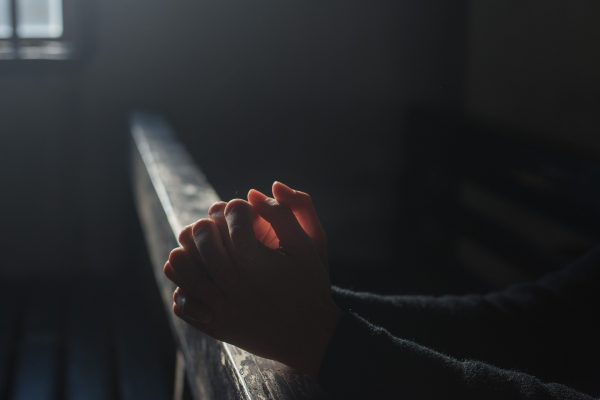A Reflection on Mark 15: 33 – 34 by Revd Chris Luckraft
When it was noon, darkness came over the whole land until three in the afternoon. At three o’clock Jesus cried out with a loud voice, ‘Eloi, Eloi, lema sabachthani?’ which means, ‘My God, my God, why have you forsaken me?’
The last words that Jesus utters are a cry of absolute dereliction, “My God, my God why have you forsaken me?” and at the same time the sky darkens dramatically. Such a darkening was common in Jewish history symbolising the passing of a great king or some other drastic event – the heavens reflecting the unfolding events on earth. We use very much the same sort of imagery when we talk about the present times, we might say that these are dark times because of the restrictions placed on us by the pandemic. But, self- evidently, these dark times come to an end, they are only temporary – they may seem interminable, but they are not, and in this case lasts for three hours. There is, therefore, a subtle allusion to the fact that the death on the cross is not the end.
This is further underlined by the cry itself. The switch in language should give us a clue, although it is not clear exactly what language is being used, mainly Aramaic but hints of Hebrew. And that clue is that this is a quote from Psalm 22, one of the psalms about the righteous sufferer – someone suffering horrifically despite their innocence. It is worth reading the whole Psalm but it opens with:
My God, my God, why have you forsaken me?
Why are you so far from helping me, from the words of my groaning?
O my God, I cry by day, but you do not answer;
and by night, but find no rest.
Yet you are holy,
enthroned on the praises of Israel.
In you our ancestors trusted;
they trusted, and you delivered them.
To you they cried, and were saved;
in you they trusted, and were not put to shame.
The remainder of the psalm alternates between despair at the sufferings of the present and trust in a redeeming God, concluding with:
To him, indeed, shall all who sleep in the earth bow down;
before him shall bow all who go down to the dust,
and I shall live for him.
Posterity will serve him;
future generations will be told about the Lord,
and proclaim his deliverance to a people yet unborn,
saying that he has done it.
The underlying message of the psalm is that of hope, despite everything that happens, the horrors that the body undergoes and will undergo, God has not deserted the sufferer. It may seem hopeless, but that is to get lost in self-pity, in the end the loving God will triumph. We should take hope that, even in his darkest hour, Jesus could foresee ultimate victory.
Holy Week Reflection – Easter Eve
In our final Holy Week reflection The Very Revd David Shearlock explores the resurrection of…
Holy Week Reflection – Good Friday
In the penultimate Holy Week reflection Barbara Simmonds LLM explores the death of Jesus. A…
Holy Week Reflection – Maundy Thursday
In the fourth of our Holy Week reflections Revd Chris Luckraft explores the last words…
Holy Week Reflection – Wednesday
In the third of our Holy Week reflections The Venerable Patrick Evans explores the apostles…
Holy Week Reflection – Tuesday
In the second of our Holy Week reflections Revd Prebendary Alastair Wheeler explores the events…
Holy Week Reflection – Monday
In the first of our Holy Week reflections Rev Fiona Beale explores the events of…






